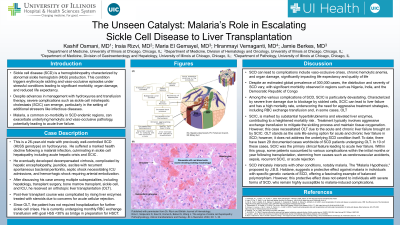Sunday Poster Session
Category: Liver
P1325 - The Unseen Catalyst: Malaria's Role in Escalating Sickle Cell Disease to Liver Transplantation
Sunday, October 27, 2024
3:30 PM - 7:00 PM ET
Location: Exhibit Hall E

Has Audio
- KO
Kashif Osmani, MD
University of Illinois College of Medicine
Chicago, IL
Presenting Author(s)
Kashif Osmani, MD1, Insia Rizvi, MD2, Maria El Gemayel, MD3, Hiranmayi Vemaganti, MD2, Jamie Berkes, MD2
1University of Illinois College of Medicine, Chicago, IL; 2University of Illinois at Chicago, Chicago, IL; 3University of Illinois, Chicago, IL
Introduction: Sickle cell disease (SCD) is a hemoglobinopathy characterized by abnormal sickle hemoglobin (HbS) production. This condition triggers erythrocyte sickling and vaso-occlusive episodes under stressful conditions leading to significant morbidity, organ damage, and reduced life expectancy. Despite advances in management with hydroxyurea and transfusion therapy, severe complications such as sickle cell intrahepatic cholestasis (SCIC) can emerge, particularly in the setting of additional stressors like infectious diseases. Malaria, a common co-morbidity in SCD endemic regions, can exacerbate underlying hemolytic and vaso-occlusive pathology, potentially leading to acute liver failure.
Case Description/Methods: This is a 26-year-old male with previously well-controlled SCD (HbSS genotype) on hydroxyurea. He suffered a marked health decline following a malarial infection, culminating in sickle cell hepatopathy including acute hepatic crisis and SCIC. He eventually developed decompensated cirrhosis, complicated by hepatic encephalopathy, jaundice, ascites with recurrent spontaneous bacterial peritonitis, septic shock necessitating ICU admissions, and hemorrhagic shock requiring arterial embolization. After discussing his case among multiple subspecialties, including hepatology, transplant surgery, bone marrow transplant, sickle cell, and ICU, he received an orthotopic liver transplantation (OLT). Post-liver transplant course was complicated by rising liver enzymes treated with steroids due to concerns for acute cellular rejection. Since OLT, the patient has not required hospitalization for further sickle cell crises. He is currently undergoing monthly RBC exchange transfusion with the goal HbS < 30% as bridge in preparation for HSCT.
Discussion: This case highlights the intricate interplay between SCD and infectious diseases, underscoring the potential for rapid disease progression and the necessity for advanced therapeutic interventions. Despite the high mortality associated with SCIC, liver transplantation provided a lifesaving outcome, emphasizing the importance of recognizing SCIC as a critical yet treatable complication in SCD. This case contributes to the limited literature on OLT in SCD, advocating for increased awareness and prompt management strategies in patients at risk for severe complications. This is the first documented instance of a patient receiving OLT and then preparing to undergo HSCT in such a short period for the curative treatment of SCD.
Disclosures:
Kashif Osmani, MD1, Insia Rizvi, MD2, Maria El Gemayel, MD3, Hiranmayi Vemaganti, MD2, Jamie Berkes, MD2. P1325 - The Unseen Catalyst: Malaria's Role in Escalating Sickle Cell Disease to Liver Transplantation, ACG 2024 Annual Scientific Meeting Abstracts. Philadelphia, PA: American College of Gastroenterology.
1University of Illinois College of Medicine, Chicago, IL; 2University of Illinois at Chicago, Chicago, IL; 3University of Illinois, Chicago, IL
Introduction: Sickle cell disease (SCD) is a hemoglobinopathy characterized by abnormal sickle hemoglobin (HbS) production. This condition triggers erythrocyte sickling and vaso-occlusive episodes under stressful conditions leading to significant morbidity, organ damage, and reduced life expectancy. Despite advances in management with hydroxyurea and transfusion therapy, severe complications such as sickle cell intrahepatic cholestasis (SCIC) can emerge, particularly in the setting of additional stressors like infectious diseases. Malaria, a common co-morbidity in SCD endemic regions, can exacerbate underlying hemolytic and vaso-occlusive pathology, potentially leading to acute liver failure.
Case Description/Methods: This is a 26-year-old male with previously well-controlled SCD (HbSS genotype) on hydroxyurea. He suffered a marked health decline following a malarial infection, culminating in sickle cell hepatopathy including acute hepatic crisis and SCIC. He eventually developed decompensated cirrhosis, complicated by hepatic encephalopathy, jaundice, ascites with recurrent spontaneous bacterial peritonitis, septic shock necessitating ICU admissions, and hemorrhagic shock requiring arterial embolization. After discussing his case among multiple subspecialties, including hepatology, transplant surgery, bone marrow transplant, sickle cell, and ICU, he received an orthotopic liver transplantation (OLT). Post-liver transplant course was complicated by rising liver enzymes treated with steroids due to concerns for acute cellular rejection. Since OLT, the patient has not required hospitalization for further sickle cell crises. He is currently undergoing monthly RBC exchange transfusion with the goal HbS < 30% as bridge in preparation for HSCT.
Discussion: This case highlights the intricate interplay between SCD and infectious diseases, underscoring the potential for rapid disease progression and the necessity for advanced therapeutic interventions. Despite the high mortality associated with SCIC, liver transplantation provided a lifesaving outcome, emphasizing the importance of recognizing SCIC as a critical yet treatable complication in SCD. This case contributes to the limited literature on OLT in SCD, advocating for increased awareness and prompt management strategies in patients at risk for severe complications. This is the first documented instance of a patient receiving OLT and then preparing to undergo HSCT in such a short period for the curative treatment of SCD.
Disclosures:
Kashif Osmani indicated no relevant financial relationships.
Insia Rizvi indicated no relevant financial relationships.
Maria El Gemayel indicated no relevant financial relationships.
Hiranmayi Vemaganti indicated no relevant financial relationships.
Jamie Berkes indicated no relevant financial relationships.
Kashif Osmani, MD1, Insia Rizvi, MD2, Maria El Gemayel, MD3, Hiranmayi Vemaganti, MD2, Jamie Berkes, MD2. P1325 - The Unseen Catalyst: Malaria's Role in Escalating Sickle Cell Disease to Liver Transplantation, ACG 2024 Annual Scientific Meeting Abstracts. Philadelphia, PA: American College of Gastroenterology.

